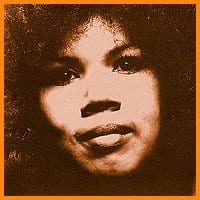Alabama’s Candi Staton is a revelation. She is mostly known for her 1976 disco hit “Young Hearts Run Free.” To most she’s just a one hit wonder. This recent compilation of her highly regarded late 1960s and early ’70s recordings for Fame records will surely change all that. Best Of Candi Staton is one of those supreme comps (like 2001’s Shuggie Otis Inspiration Information) that puts an overlooked artist’s work into historical context and gives them well-deserved props. Hallelujah.
Canzata Maria Staton was born in 1943 in the small town of Hanceville, Alabama. As a child she picked cotton and sang in the church choir. She grew up in Klan country but she loved listening to white country singers. This album is rhythm and blues with a delicate touch of country twang. Her cover of “Stand By Your Man” starts with “Stand By Me” chords and when Staton’s raspy voice sings “Sometimes it’s hard/ When you’re a woman,” you believe her. There is no camp element here. Staton had an abusive alcoholic coal miner father and an abusive jealous husband, so her version seems ironic and achingly rich with sadness.
“I’d Rather Be An Old Man’s Sweetheart (Than A Young Man’s Fool)” is a struttin’ horn-filled humorous proclamation of “old man” love. “And an old man would be so grateful/ You can just sit and talk/ While a young man is somewhere/ Doing the camel walk.” Producer Rick Hall always made Staton sing each song over and over to achieve the rasp, which he thought was essential to “sing soulfully.” Staton has a tough emotional voice similar to Etta James or even Otis Redding. “He Calls Me Baby” is a sexier, slyer, relaxed Staton with a whistling trumpet accompaniment that makes way for a mighty horn and string section and a pulsating bass line that enhances the sensual wordplay. “He called me baby, baby/ All night long/ Lord I feel so empty/ Since he’s been gone.” It’s a dynamite track.
Her version of “In The Ghetto” is gripping. This ain’t the millionaire pill-poppin’ king of rock’n’roll white man singing about ghetto life. This is a god-loving black woman (single mother of four ) working in a nursing home by day and trying to make it as a singer at night. So when she sings the line, “And his hunger burns,” there’s no denying she’s been there. All 26 tracks on this album are a joy to behold. It’s raunchy, uplifting, touching. I’m in awe of her talent. Staton is still alive and back to singing the gospel music of her youth. She’s the Coal Miner’s Daughter of the black experience.
***
Zero 7’s When It Falls is so full of nothing. It’s relentlessly boring and sickeningly slick. Zero 7, comprising of Henry Binns and Sam Hardaker, is the UK’s answer to the French group Air. After listening to this album you realize how brilliant Air is at this post-rock/wallpaper genre. Air echos that Mancini/Bacharach cool cocktail sweetness. There’s substance in the sounds. Zero 7 don’t seem to look back at anything further than Air. It’s basically martini bar music done by second-rate musicians and singers. No joy, no insanity, just melodic nonsense and the most boring lyrical content I’ve heard this year.
Every song throws in a moog here, strings and flute there. The vocals are done by capable singers who add no character, flavour nor substance. But how can they with lyrics like, “I don’t think you love me/ Confusement’s setting in”? I liked one song, “In Time.” It has a lovely folkie vibe that could be a track on Crosby, Stills, Nash and Young’s classic album, Deja Vu. Vocalist Sophie Barker sounds lovely on this track. But hey, you’ll never hear this shit on The OC. The album is so not cool.
***
Icon Debbie Harry could be your grandma. She’s almost 60 years old. Her band Blondie has recently released a new album, The Curse Of Blondie. It’s stylistically all over the place, which is not necessarily a bad thing. Their albums have always been peppered with various genres. That’s their thing.
“Good Boys” is a great dance song that recalls “Heart Of Glass.” “Undone” has a great heavy pop hook and “Golden Rod” is awesome – very Siouxsie Sioux. Harry’s voice is perfect and the guitars swirl in that new wave “too cool for you” vibe. “What’s that pretty flower I see/ Tall and wild/ It waves at me/ Mother said it’s just a weed/ golden rod.”
During their pop reign, Blondie was always ahead of things stylistically. There was the hip hop “Rapture” and the reggae-tinged “The Tide Is High.” Now, there’s the Okinawan folksongish “Magic (Asadoya Unta).” It’s my favourite track. It sounds fresh. It’s too cute for words. Nothing out there on North American radio sounds like this.
But the album ain’t perfect. Some songs are duds and there’s something too soft about it. As Harry sings on the 12th track, “Desire brings me back/ Back to where I’ve always been.” Old age pension be damned!
* Blondie plays the Guvernment on Sat, May 1; call (416) 870-8000.
BEST OF CANDI STATON.
Candi Staton.
Astalwerks.
$18.99.
WHEN IT FALLS.
Zero 7.
Elektra.
$19.99.
THE CURSE OF BLONDIE.
Blondie.
Sanctuary.
$21.99.

 Why you can trust Xtra
Why you can trust Xtra


